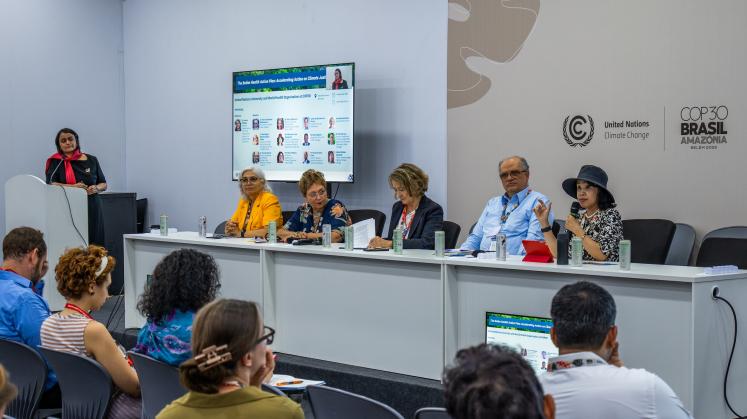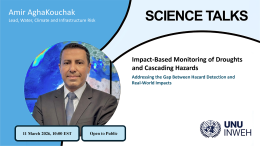A UNU side event at the 2025 UN Climate Change Conference (COP30) in Belém, Brazil explored the crucial interconnections between health, climate change and justice. Held on 14 November, the event provided high-level expert perspectives in support of the Belém Health Action Plan (BHAP) that was launched at COP30 — the first international climate adaptation plan dedicated to health.
The event, The Belém Health Action Plan: Accelerating Action on Climate Justice and Health, was organized by UNU, the World Health Organization (WHO) and other UN partners. Opening remarks by Revati Phalkey (Director, UNU-IIGH) underlined that the BHAP provides a commitment and shared promise for reimagining climate change adaptation through the lens of health.
In the first of two panel discussions, Agnes Soares da Silva (Director, Department of Environmental Health and Occupational Health Surveillance, Ministry of Health, Brazil) highlighted the plan’s cross-cutting principles of equity and climate justice. A video message from Tedros Ghebreyesus (Director-General, WHO) emphasized the recent advisory opinion by the International Court of Justice (ICJ) on climate change — which recognizes that the climate crisis is a health crisis, and that states have obligations to prevent climate harm. Gerry Eijkemans (Director, Social and Environmental Determinants for Health Equity, Pan American Health Organization; PAHO) welcomed the BHAP as an opportunity to act on climate change in a way that closes equity gaps rather than widening them. Ilze Brands Kehris (Assistant-Secretary General, UN Human Rights Office; OHCHR) called for embracing the One Health approach — and underlined that climate change adaptation must safeguard the rights of future generations, who will bear the brunt of climate impacts.
Noting that only 1% of climate finance was directed towards health, Youssef Nassef (Director, Adaptation Unit, UN Climate Change; UNFCCC Secretariat) highlighted the need to translate commitments into action, and the value of the BHAP in placing people at the centre of adaptation. Shinobu Yume Yamaguchi (Director, UNU-IAS) commended the plan’s focus on cross-sectoral action and outlined how UNU would contribute through interdisciplinary research on sustainability, mobilizing global networks and connecting research outcomes to capacity development. She highlighted relevant research by UNU-EHS on extreme heat and by UNU-IAS on links between biodiversity, health and sustainability.
In the second panel discussion, Elisa Morgera (UN Special Rapporteur on Climate Change & Human Rights) underlined that the human right to a healthy environment captures deep interconnections that must drive more effective climate adaptation. A video message from Raji Tajudeen (Deputy Director-General, Africa CDC) emphasized that climate adaptation is both a public health imperative and a moral responsibility, calling for evidence-based and globally connected solutions. Meike van Ginneken (Water Envoy, The Netherlands) highlighted the potential of health as a driver of climate adaptation, noting that bicycle use in the Netherlands leads to cleaner air, more active lifestyles and reduced diseases — accounting for 3% of the country’s GDP. Eduardo Samo Gudo (Director General, National Institute of Health, Mozambique) warned that failing to address climate change would undermine progress on health targets, including SDG 3, and called for a focus on frontline health workers in managing climate impacts.
In a video message, Ronald Law (Director, Health and Climate Change Office, Department of Health, the Philippines) emphasized strengthening health preparedness — particularly local government capacity — to protect people from climate impacts such as extreme weather events. Abdul Mufeez Shaheed (Pacific Islands Students Fighting Climate Change) outlined how a campaign started by students in the Pacific region had led to the ICJ decision. He explained how the advisory opinion directly links the health impacts of climate change to states’ obligations under international law, and determines that the 1.5°C temperature target is legally binding under the Paris Agreement.



